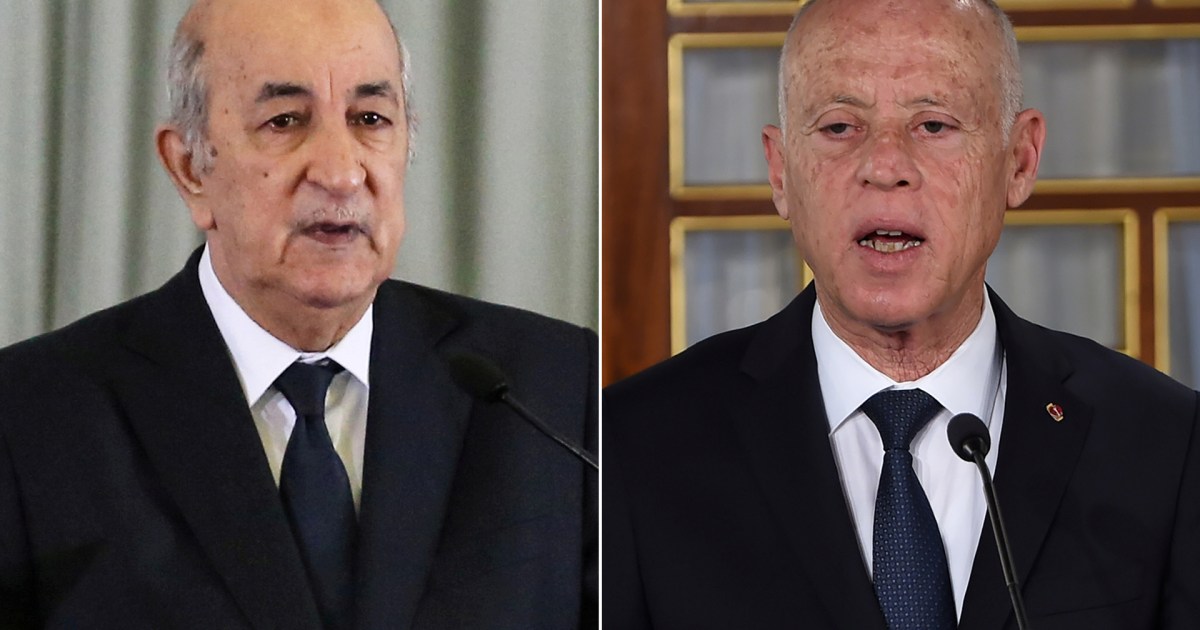Today, Tuesday, Algerian President Abdelmadjid Tebboune congratulated his Tunisian counterpart, Kais Saied, on the installation of a new government in his country, while Saied stressed that the country will remain in light of the exceptional measures he announced last July.
The Tunisian president justified his decision by what he called the danger in Parliament.
The Algerian presidency said in a statement that "Taboun made a phone call today with his brother, Kais Saied, the President of the sisterly Republic of Tunisia, in which he congratulated him on the occasion of the inauguration of the new government, wishing him and his government success and payment."
The statement added that strengthening bilateral cooperation in various fields will be the focus of the upcoming visit of the President of the Republic (Taboun) to Tunisia.
Yesterday evening, Sunday, the Algerian president said - in an interview with local media, which was broadcast on state television - that he will visit Tunisia soon at the head of a large government delegation to move the wheel of cooperation between the two countries.
Yesterday, Monday, the new Tunisian Prime Minister Najla Boden and members of her government were sworn in before President Said at the Carthage Palace, becoming the first woman in the country's history to hold this high position.
political division
For his part, former Tunisian President Moncef Marzouki said that the new Tunisian government has no weight or legitimacy, and is doomed to failure, as he put it.
Al-Marzouki added - in an interview with "Al-Jazeera Mubasher" - that most members of the government do not have the necessary political or economic experience, at a time when the country needs such matters to get it out of its crisis.
In turn, the opposition Tunisian Workers' Party described Najla Boden's government as a coup government, and considered the prime minister's speech - while she was sworn in - without content, and not up to the level of general trends.
The party called for unity around a national, democratic and popular project that would put an end to the rule of what it described as "barons" of corruption.
For her part, the head of the Hope Party, Salma Al-Loumi Al-Raqib, said that Boden's speech did not include elements related to the government's program, although it included a declaration of goodwill.
On the other hand, the Tunisian General Labor Union (the largest union organization) welcomed the announcement of the new government, while Hamma Hammami, Secretary-General of the Workers' Party, criticized President Kais Saied's policies, describing them as populist.
Sami Al-Tahiri, Assistant Secretary-General of the Tunisian General Labor Union, said that the union calls for a participatory dialogue and setting a time limit for exceptional measures.
The Tunisian General Labor Union also welcomed the government's announcement;
He said it would restart the wheel of the state.
The director of Al Jazeera's office in Tunisia, Lotfi Hajji, said that the member of the executive office of the union, Samir Al-Shifi, stressed that the union is waiting for an economic and social program away from the words of construction, as he put it. Al-Shifi also denied that the union has any relationship with the consultations to form the new government.
Hajji indicated that the People's Movement in support of President Said rejoiced at this government, and said it was waiting for action, pointing out that this government comes as an expression of the president's program.
Tunisia has been suffering since last July 25, a severe political crisis, as its president, Kais Saied, began a series of exceptional decisions, including the dismissal of Prime Minister Hisham Al-Mashishi, provided that he assume the executive authority with the assistance of a government that appointed its president, freezing the competencies of Parliament, lifting the immunity of its deputies, and abolishing a monitoring body. The constitutionality of laws, the issuance of legislation by presidential decrees, and it is headed by the Public Prosecution.
The majority of political forces reject Said's exceptional decisions, and consider them a "coup against the constitution", while other forces support them as a "correction of the course of the 2011 revolution", in light of the political and economic crises and the Corona pandemic.This revolution overthrew the regime of then-President Zine El Abidine Ben Ali (1987- 2011).

